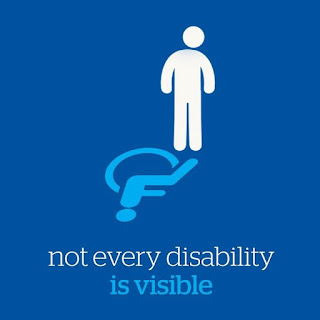You're Sick, Again!?
There have been times in the lives of people with silent diseases, illnesses, or syndromes when they have heard, "You're sick, again?" in a tone that lets them know that the person speaking these words is done. They can come from family, friends or from those at work. How can you respond to this?
First, let me say that hearing this is like someone running their nails down a blackboard. If a person with a silent illness hears this regularly, it can cause emotional and mental stress, which then leads to a host of other issues. Having someone to talk, someone who understands the condition as well as your history, is key to staying on an even keel.
Additionally, knowing how to respond, what to say and how to explain your condition so that others can understand is very important. This takes courage. Too many of us simply shut down. We either walk away, give some cursory answer that does nothing to enlighten the speaker of the irritating words, or explode from pent up frustration and anger - none of which are productive. In a future post, we will go in depth into resources and ways to respond.
Today, however, we will look at what to do and how to help yourself in the work environment. A worker with a silent illness often hears, "You're sick, again!?" in some form or another. This becomes a significant issue when the words are spoken by coworkers, managers, or the boss. What is not understood is that silent illnesses also bring invisible disabilities
To begin, let's look at the word "disabled." The American Disability Act defines, in legal terms, a person with "disability" as,"...a person who has a physical or mental impairment that substantially limits one or more major life activities. This includes people who have a record of such an impairment, even if they do not currently have a disability. It also includes individuals who do not have a disability but are regarded as having a disability. The ADA also makes it unlawful to discriminate against a person based on that person’s association with a person with a disability."
Therefore, those who suffer from migraines, fibromyalgia, MS, and countless other conditions are "disabled" and are eligible for "accommodations." But, what does that really mean?
Let me give you an example. Fibromyalgia can cause a person to be hypersensitive to smell, sounds, touch, etc. When triggered, these conditions can cause other physical issues. Therefore, a constant tap, tap, tap that most people would not even hear, could trigger a migraine. The scent of perfume or chemicals could bring on an asthma attack. A uniform made of a particularly rough material could cause a skin irritation that becomes unbearable. (More on Fibro and accommodations can be found on the Job Accommodation Network.)
If the person experiencing these things is working, they become unable to do their work without accommodations. The ADA clearly states that these accommodations must be made by the employee's business. Unfortunately, many people do not understand or even know this. Consequently, employees are either harassed until they quit or are fired outright for not being able to do their job. Both the harassment and the firing are, under the ADA, illegal, and can trigger further mental and emotional distress.
If you or someone you love suffers from a silent illness, (A comprehensive list can be found in the document Invisible Disabilities List & Information with links to resources.) learn about not only the condition, but what the law is regarding accommodations when that person is employed.
Living a productive life, part of "the pursuit of happiness" is one of our inalienable rights. Thankfully, we are blessed with laws that govern the ability for people with disabilities to have accommodations to do just that.
Remember - not all disabilities are seen; therefore, we must be our own advocates. Educate yourself and others, seek reasonable accommodations, know your rights under the ADA.
For more information:
Invisible Disabilities
ADA
ACLU and Disability Rights




Comments